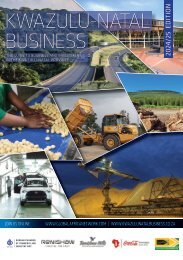South African Business 2018 edition
Welcome to the sixth edition of the South African Business journal. First published in 2011, the publication has established itself as the premier business and investment guide to South Africa, supported by an e-book edition at www.southafricanbusiness.co.za. Regular pages cover all the main economic sectors of the South African economy and give a snapshot of each of the country’s provincial economies. Feature articles on topical issues such as sustainability and African trade provide unique insights, together with an interview with the newly elected chairman of the African Association of Automotive Manufacturers, Mr Thomas Schaefer. Another special feature focusses on an exciting project to transform South Africa’s small harbours and coastal properties. South African Business is complemented by nine regional publications covering the business and investment environment in each of South Africa’s provinces. The e-book editions can be viewed online at www.globalafricanetwork.com. First published in 2011, the publication has established itself as the premier business and investment guide to South Africa, supported by an e-book edition at www.southafricanbusiness.co.za Regular pages cover all the main economic sectors of the South African economy and give a snapshot of each of the country’s provincial economies. Feature articles on topical issues such as sustainability and African trade provide unique insights, together with an interview with the newly elected chairman of the African Association of Automotive Manufacturers, Mr Thomas Schaefer. Another special feature focusses on an exciting project to transform South Africa’s small harbours and coastal properties. South African Business is complemented by nine regional publications covering the business and investment environment in each of South Africa’s provinces. Visit www.globalafricanetwork.com for more business and investment news, opportunities and events.
Welcome to the sixth edition of the South African Business journal. First published in 2011, the publication has established itself as the premier business and investment guide to South Africa, supported by an e-book edition at www.southafricanbusiness.co.za.
Regular pages cover all the main economic sectors of the South African economy and give a snapshot of each of the country’s provincial economies. Feature articles on topical issues such as sustainability and African trade provide unique insights, together with an interview with the newly elected chairman of the African Association of Automotive Manufacturers, Mr Thomas Schaefer. Another special feature focusses on an exciting project to transform South Africa’s small harbours and coastal properties.
South African Business is complemented by nine regional publications covering the business and investment environment in each of South Africa’s provinces. The e-book editions can be viewed online at www.globalafricanetwork.com.
First published in 2011, the publication has established itself as the premier business and investment guide to South Africa, supported by an e-book edition at www.southafricanbusiness.co.za
Regular pages cover all the main economic sectors of the South African economy and give a snapshot of each of the country’s provincial economies. Feature articles on topical issues such as sustainability and African trade provide unique insights, together with an interview with the newly elected chairman of the African Association of Automotive Manufacturers, Mr Thomas Schaefer. Another special feature focusses on an exciting project to transform South Africa’s small harbours and coastal properties.
South African Business is complemented by nine regional publications covering the business and investment environment in each of South Africa’s provinces. Visit www.globalafricanetwork.com for more business and investment news, opportunities and events.
Create successful ePaper yourself
Turn your PDF publications into a flip-book with our unique Google optimized e-Paper software.
OVERVIEW<br />
Information and communications<br />
technology<br />
A rural network is providing free local calls.<br />
SECTOR INSIGHT<br />
Barclays Africa Group spent<br />
R3.1-billion on ICT in 2016.<br />
• Farmers and Vodacom<br />
are working on a sheeptracking<br />
collar.<br />
The biggest spenders on information communications technology<br />
(ICT) are banks and other financial institutions. Existing banks may<br />
have large customer bases but agile new competitors are able to<br />
do without branch infrastructure and can connect directly with<br />
clients via mobile phones and other devices. The financial sector is<br />
responding via large investments in fintech.<br />
One example is Barclays Africa Group’s expenditure of R3.1-billion<br />
on ICT in 2016. The Big Four banks spent R30-billion in the year to<br />
June 2016, with Standard Bank laying out R14-billion in that period<br />
(Tech Central).<br />
Companies in the sector are also spending heavily to stay ahead in<br />
terms of technology. By way of example, Vodacom has spent approximately<br />
R577-million over three years in the province of Limpopo alone.<br />
<strong>South</strong> Africa’s appetite for fast Internet connectivity is growing fast.<br />
The state-owned company Telkom controls most of the country’s fibre<br />
cable but several smaller private companies are winning contracts to<br />
lay fibre-optic cables around the country.<br />
The Mail & Guardian reported in April 2016 that “nimble new entrants”<br />
such as Vumatel, Fibrehoods, Link Africa (which runs its network<br />
in the sewerage system, obviating the need to dig new trenches) and<br />
Dark Fibre Africa are forcing the bigger telecommunications companies<br />
to up their game. With faster Internet speeds, customers could switch<br />
away from subscriber television services.<br />
Allowing access to the Internet<br />
to rural people and poorer people<br />
in urban areas is a policy priority.<br />
Access in <strong>South</strong> Africa is improving<br />
all the time. As part of its mandate,<br />
the Independent Communications<br />
Authority of <strong>South</strong> Africa (ICASA)<br />
has seen to it that various private<br />
operators have connected more<br />
than 623 schools around the country.<br />
The Western Cape Provincial<br />
Government and Neotel will roll<br />
out 384 Wi-Fi hotspots in public<br />
areas, and is aiming for complete<br />
coverage by 2019.<br />
Private companies like<br />
Vodacom allocate specific budget<br />
items to rural access and in<br />
September 2017 it announced<br />
that it would zero-rate its services<br />
for university student and staff<br />
who are Vodacom subscribers. To<br />
illustrate the vastly different uses<br />
to which technology can be put,<br />
Vodacom is also developing an<br />
affordable sheep-tracking collar<br />
with farmers in the Eastern Cape.<br />
There are also city programmes<br />
such as the TshWifi (Tshwane), a<br />
SOUTH AFRICAN BUSINESS <strong>2018</strong><br />
126


















